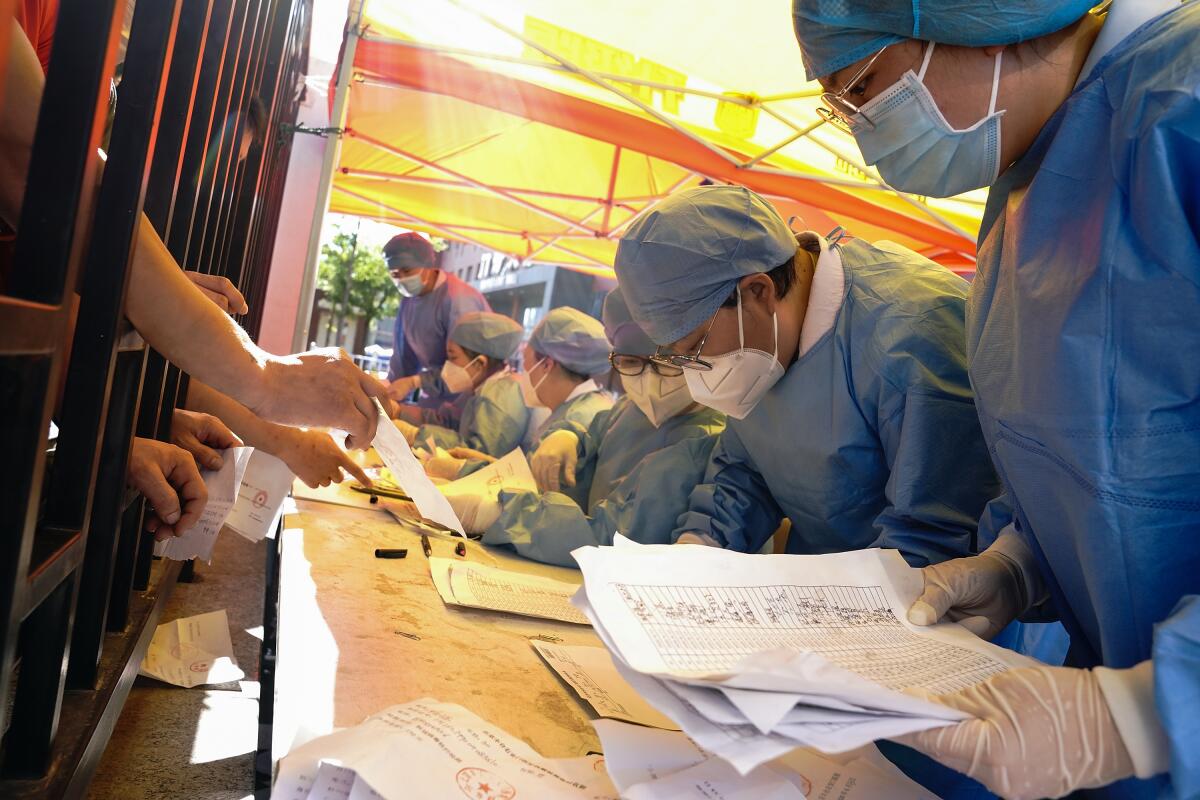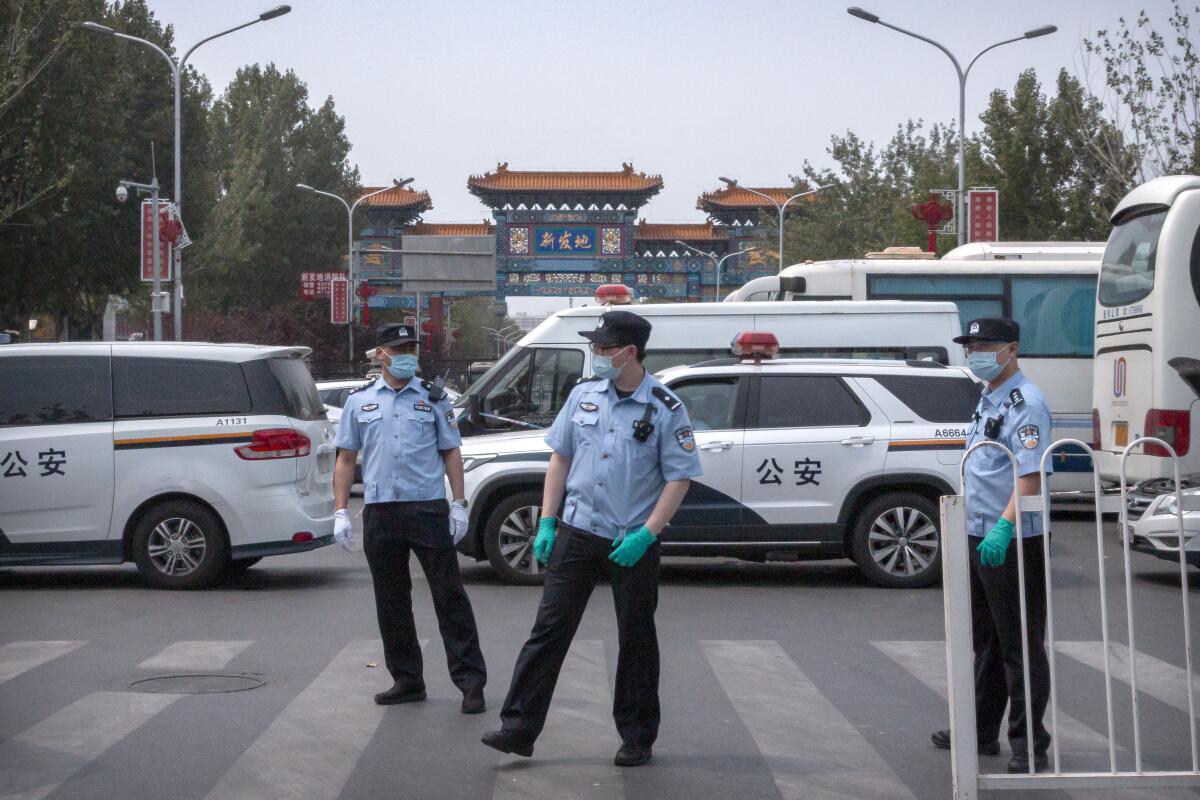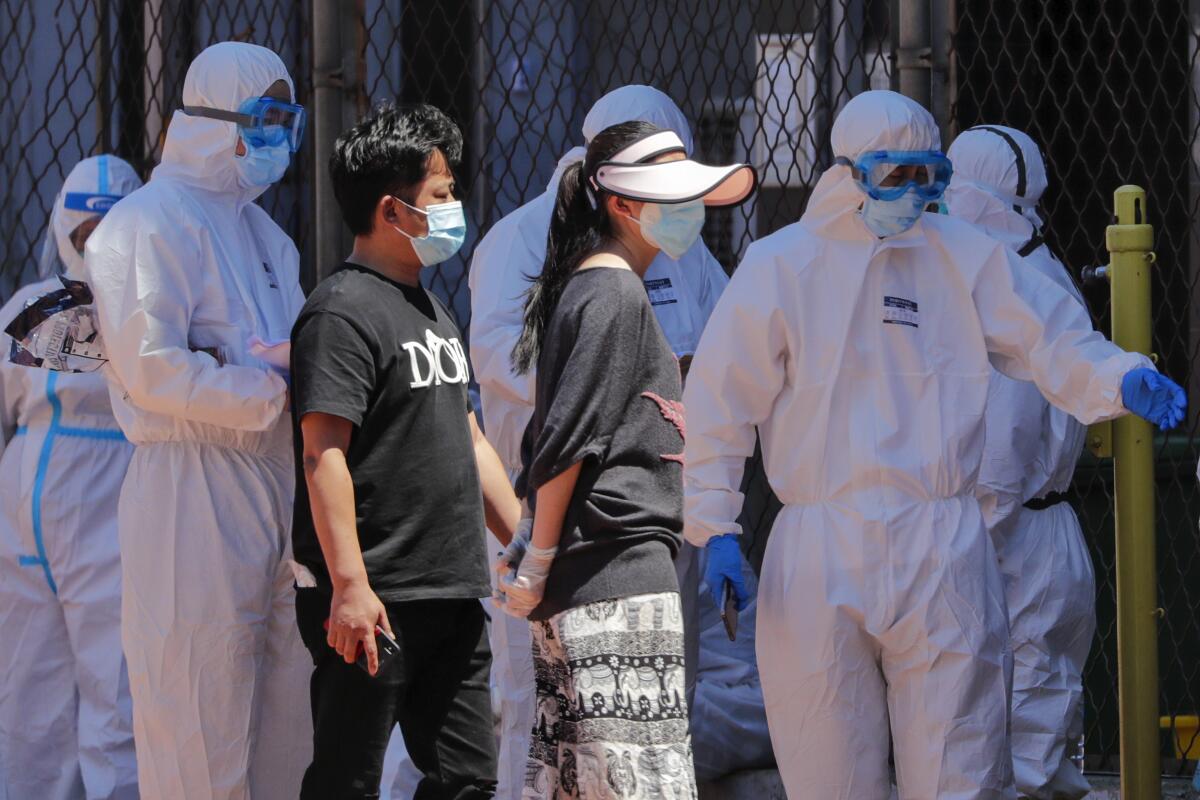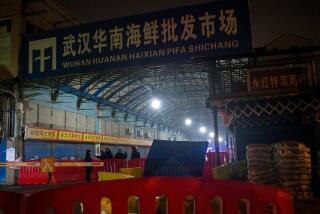Fears of a second coronavirus wave rise in China as Beijing battles new cluster

- Share via
BEIJING — Fears of a second wave of coronavirus infections struck China’s capital city as a new cluster was discovered over the weekend, centered on a massive seafood, meat and produce market in the southern Fengtai district of Beijing.
Beijing’s health authorities reported six confirmed cases Saturday, 36 new cases Sunday and another 36 cases on Monday. All were locally transmitted infections, breaking a months-long trend of China reporting mostly imported COVID-19 cases while the domestic transmission seemed to be largely under control.
It is a stark reminder that virus can return after months of seemingly no local spread — even in one of the most tightly controlled cities in a country that has taken severe measures to halt transmission at home and from abroad.
How the new patients became infected remains unclear. But Chinese authorities have zeroed in on the new cases’ shared links to Xinfadi market, a sprawling wholesale market that supplies more than 70% of Beijing’s fruits and vegetables, according to local news reports. The market also includes wholesale sections dedicated to beef, lamb and seafood.
Two of the newly infected people were employees at the China Meat Research Center, a food research institute in the same district. Most of the others were either workers at Xinfadi — drivers, vendors, delivery people — or close contacts of market workers.
Xinfadi was closed at 3 a.m. Saturday after at least two of three patients found Thursday and Friday reported having visited the market. Police were sent to patrol Xinfadi as authorities sent guards to lock down 11 communities around the market and close nine schools and kindergartens that had already resumed classes.
At least 139 close contacts of the newly infected people were put in quarantine.
By midday Saturday, Beijing authorities said they had collected more than 5,000 environmental samples from major wholesale markets around the city, including 1,901 swabs from the floors, tables, products, door handles, trash cans and other surfaces at Xinfadi.
They found 40 samples with traces of the coronavirus at Xinfadi, including from the chopping boards used for cutting salmon.
Major supermarkets across Beijing pulled salmon off their shelves overnight. Some restaurants refused to sell items with salmon Saturday.

Authorities mobilized mass testing in the Fengtai district Saturday and required neighborhood workers to call residents one by one, screening for anyone who’d visited Xinfadi in recent days. More than 10,000 market workers and close contacts will be tested, as will anyone in Beijing or neighboring Tianjin city and Hebei province who has visited Xinfadi or has had close contact with Xinfadi visitors since May 30.
Tourism and sports events have been banned. A long-distance-bus station near Xinfadi has been closed. A plan to allow Beijing students in first through third grades to resume classes Monday was canceled.
Beijing, home to most of the country’s highest-ranking elites and Communist Party officials, had some of the strictest COVID-19 restrictions in China and was among the last to relax them. For months, international flights have been rerouted to nearby cities, with passengers required to be tested and isolated for 14 days before they can enter the city.
Beijing had finally relaxed its restrictions this month after the postponed Two Sessions, China’s most important annual political meetings, took place in late May. Three thousand delegates from across the nation were tested and isolated before they could attend, while the few journalists permitted entry could only do so after they had received negative results from same-day COVID-19 tests.

In recent days, Beijing had all but returned to normal. More people removed their masks while exercising outside. Restaurants still had QR codes to scan and track customers’ health conditions, but few were enforcing their use.
Bored security guards pointed thermometer guns past people as they entered malls and apartment complexes, not bothering to check if a temperature was displayed.
Those restrictions are now tightening again. Guards blocked shoppers from entering a popular shopping mall Saturday afternoon, insisting they display green QR codes proving their health status.
“Haven’t you heard about the new cases?” one guard hollered at a resistant young woman.
Concerns over food safety and prices have risen, as health experts scramble to answer questions about whether frozen food, produce or food packaging can carry the coronavirus. Reports that at least one of the confirmed cases was a restaurant worker have added to the anxiety. Several other cities have warned their residents not to visit Beijing.
“Beijing has entered a critical period,” Xu Hejian, a spokesman for the Beijing city government, said at a briefing Sunday.
Yang Peng, an expert at the Chinese Center for Disease Control and Prevention in Beijing, said in an interview with state channel CCTV on Sunday evening that a whole-genome test of the newly found virus infections indicated that they came “from the direction of Europe.”
Chinese experts’ initial conclusion was that there was imported transmission into the market, he said, though the exact path remained unclear.
It could have been contaminated seafood or meat, or transmission through respiratory droplets from people entering the market, Yang said. Evidence showed human-to-human transmission took place in the market, he said, but infection via touching surfaces was also possible.
Most of the positive samples taken at the market were found in the basement level of the meat and seafood exchange buildings, he said, an enclosed space with less air circulation.
The reappearance of a local COVID-19 cluster is a critical reminder that China — and most of the world — should not relax, because we do not have herd immunity, Yang said.
“It’s still a very complicated new virus whose rules we have not clearly grasped. Our immunity remains very low,” he said. “We still have to stay in a wartime mode.”
More to Read
Sign up for Essential California
The most important California stories and recommendations in your inbox every morning.
You may occasionally receive promotional content from the Los Angeles Times.











